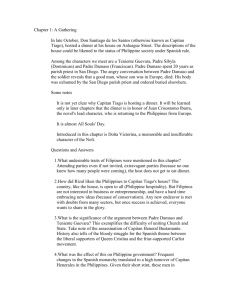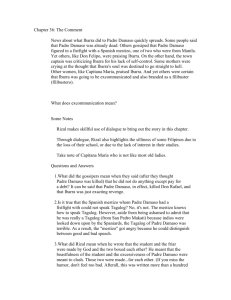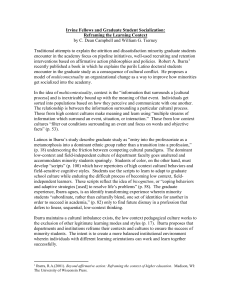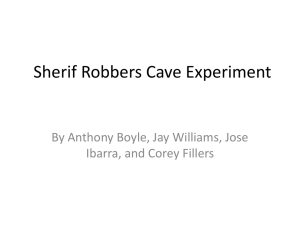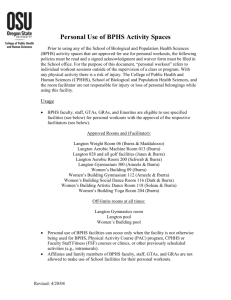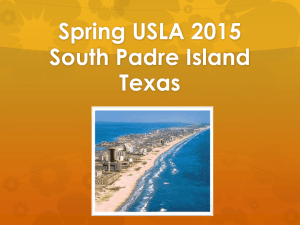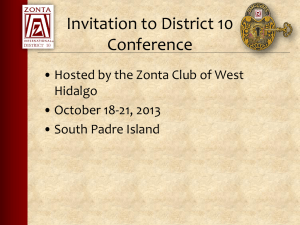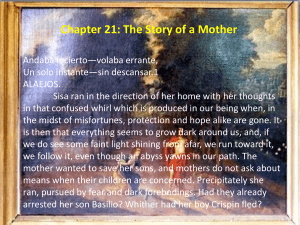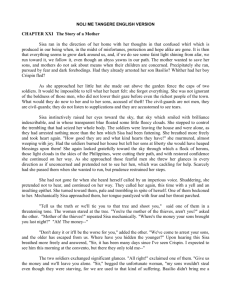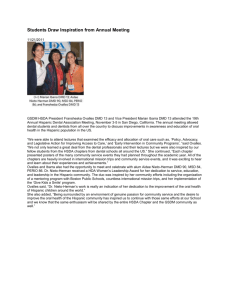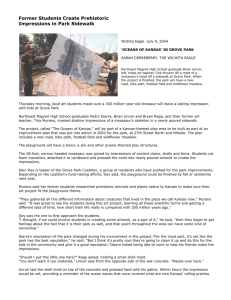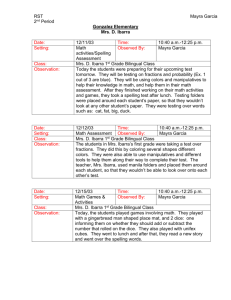Chapter 35: The Luncheon
advertisement
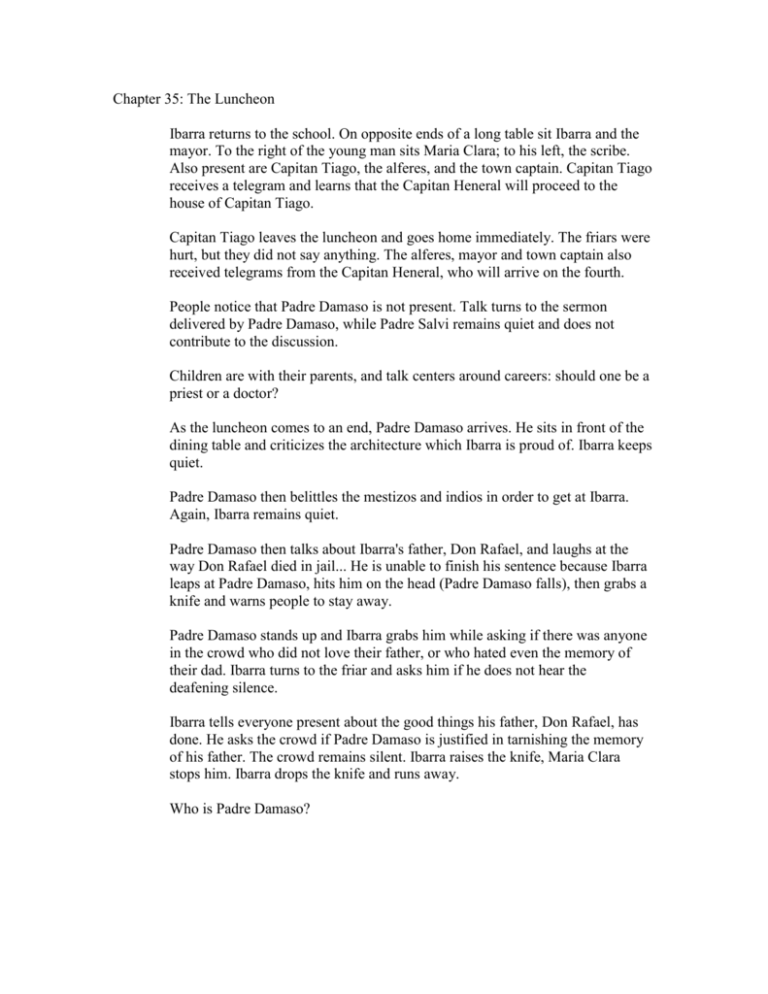
Chapter 35: The Luncheon Ibarra returns to the school. On opposite ends of a long table sit Ibarra and the mayor. To the right of the young man sits Maria Clara; to his left, the scribe. Also present are Capitan Tiago, the alferes, and the town captain. Capitan Tiago receives a telegram and learns that the Capitan Heneral will proceed to the house of Capitan Tiago. Capitan Tiago leaves the luncheon and goes home immediately. The friars were hurt, but they did not say anything. The alferes, mayor and town captain also received telegrams from the Capitan Heneral, who will arrive on the fourth. People notice that Padre Damaso is not present. Talk turns to the sermon delivered by Padre Damaso, while Padre Salvi remains quiet and does not contribute to the discussion. Children are with their parents, and talk centers around careers: should one be a priest or a doctor? As the luncheon comes to an end, Padre Damaso arrives. He sits in front of the dining table and criticizes the architecture which Ibarra is proud of. Ibarra keeps quiet. Padre Damaso then belittles the mestizos and indios in order to get at Ibarra. Again, Ibarra remains quiet. Padre Damaso then talks about Ibarra's father, Don Rafael, and laughs at the way Don Rafael died in jail... He is unable to finish his sentence because Ibarra leaps at Padre Damaso, hits him on the head (Padre Damaso falls), then grabs a knife and warns people to stay away. Padre Damaso stands up and Ibarra grabs him while asking if there was anyone in the crowd who did not love their father, or who hated even the memory of their dad. Ibarra turns to the friar and asks him if he does not hear the deafening silence. Ibarra tells everyone present about the good things his father, Don Rafael, has done. He asks the crowd if Padre Damaso is justified in tarnishing the memory of his father. The crowd remains silent. Ibarra raises the knife, Maria Clara stops him. Ibarra drops the knife and runs away. Who is Padre Damaso? Some Notes The Capitan Heneral is a Liberal. Questions and Answers 1.Why is the Capitan Heneral going to the house of Capitan Tiago? This will be revealed in the next chapter. 2.Why did the friars feel bad? Traditionally, a capitan heneral proceeds to the convent/church. In addition, Capitan Tiago is neither a Spaniard nor a mestizo. 3.Who was the mayor referring to (dinner guest called Platon)? He was referring to the Capitan Heneral. Platon (Plato of Greece) symbolizes Wisdom/Intellect. 4.Did Ibarra deliberately not invite Padre Damaso to the luncheon? Yes, this was deliberate because Ibarra was trying to avoid Padre Damaso. 5.From the conversation between Padre Salvi and the mayor, what can we infer from the latter (mayor)? The Mayor is after money, not the stature of his position or office. Hence, he is not interested in governing well, but in exploiting his position. 6.Why did Padre Salvi remain silent? We can only speculate: If he had any part in the failed assassination attempt on Ibarra, perhaps he was feeling depressed about the failure and was secretly plotting yet another evil deed on the sweetheart of Maria Clara (whom Padre Salvi is really interested in). Or perhaps he was thinking about his being imprisoned in his friar's habit and duties, which is clearly outside the world of Maria Clara. 7.What did Rizal say about the way Filipinos discipline their children especially when they are in front of others? Parents were very domineering which explains why a lot of kids grew up meek and timid. As a result, inner talents could not surface because the children were cowed into subservience by a parent's glare or pinch. (No wonder some old parents ask their errant kids: "Hindi ka ba makuha sa isang tingin?" [Will you not get in line with just one look from me?]) 8.From the career discussion (should a child be a priest or a doctor), what can be said about the effectivity of schools? The ignorance of parents has caused some of them to prevent their children from going to the school of teachers in San Diego. They realize, however, that Ibarra's school will allow their children to become professionals one day. 9.Why did Padre Damaso come to the luncheon even if he was not invited? Here we can see the boorishness of the friar. He thinks that there's nothing he cannot do. He came to publicly humiliate Ibarra. He knew that the moment Ibarra fights him, the powerful frailocracy will be the collective enemy of Ibarra, and this will help separate Ibarra from Maria Clara. 10.What criticisms did Padre Damaso level at Ibarra? He laughed at the architecture of Ibarra's school. He criticized Ibarra for paying huge salaries to those who built the school. He belittled Ibarra as a mere mestisilyo who is looked down upon by Spaniards. He called Ibarra an indio who, after going to America to learn only a few things, has become proud and ostentatious. 11.And what did Ibarra do while he was being humiliated? Nothing. He just kept quiet. 12.What made Ibarra break his silence, hit the friar, and threaten to stab Padre Damaso? Padre Damaso's narration of how Don Rafael (Ibarra's father) died in jail. 13.What did Ibarra mean when he said that he was avoiding Padre Damaso, God brought the friar to Ibarra, and therefore God made a judgment? Eversince Ibarra found out that Padre Damaso had a hand in Don Rafael's imprisonment and death, he resolved not to exact revenge, but to just avoid the friar. Even in church, Ibarra kept his mouth shut. This time, however, he did not invite Padre Damaso to the luncheon and yet there was the friar, sullying the memory of Ibarra's father. Ibarra considered this a sign from God and a confirmation that the friar was sent to Ibarra to be punished. 14.What can we say about the fact that from the many people present, it was only Maria Clara who stopped Ibarra from killing Padre Damaso? This reveals that, contrary to the belief that Maria Clara is timid or shy, she is actually decisive and is capable of clear thinking (even during times of crisis).
